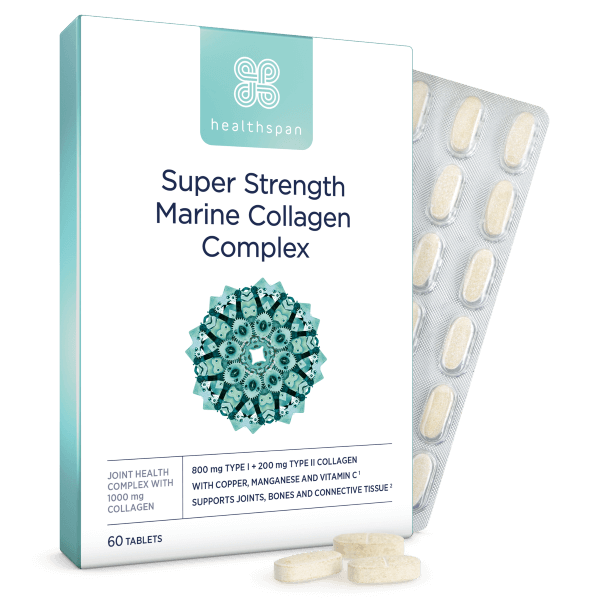Collagen can help our joints in a number of ways, from maintaining mobility to recovering from injury. Health journalist Karen Evennett explains.
🕒 4 min read
What is collagen?
Collagen is the protein that provides strength and structure to most of your body's tissues – from your skin and nails to your teeth, bones, and muscles. But not all collagen is equal; there are actually 28 different types, and they all have different roles to play.
What are the main types of collagen?
Type I is by far the most common form. This is the collagen that's found in your skin, bones, and teeth.
For healthy joints, you need type II. Then there's type III, which supports your muscles and blood vessels.
How does type II collagen help your joints?
Type II collagen is a key component in your articular cartilage – the cushioning in your joints that protects the ends of your bones to stop them rubbing together, and acts as a shock absorber. You need type II collagen to build this articular cartilage.
If you don't have enough of this cartilage, your joints could lose their flexibility and become less well supported.
Without sufficient type II collagen, the quality and quantity of your protective cartilage deteriorates, leaving your bones at risk of rubbing against each other. With nothing to buffer them, this can be excruciatingly painful.

Super Strength Marine Collagen Complex
Joint health supplement containing type II collagen
- Joint health marine collagen complex with 1,000mg collagen
- With type II collagen, the type found in the cartilage that helps cushion your joints
- Helps to support your joints, bones, and connective tissue
Could boosting your collagen prevent joint pain?
Low levels of collagen also lead to looser tendons, putting you at greater risk of a joint injury.
Research has shown that age-related collagen loss increases your risk of degenerative joint disorders like osteoarthritis.1
It's thought that the extra protein you get from boosting your collagen intake accumulates in your articular cartilage,2 and may also stimulate your body to produce more collagen – although you will not be able to rebuild lost or damaged cartilage.
Could collagen also help to treat injuries?
It's possible. In one study, 147 athletes taking 10g collagen daily for six months had significantly less activity-related joint pain.3
In other research, people taking just 2g daily for two months were able to be more physically active than the control group who didn't take the supplements.4
Unfortunately, your ability to create collagen – the process of collagen synthesis – declines as you age, meaning your levels of collagen fall.
To make matters worse, the collagen you do make is of lower quality.
Lifestyle also has an impact, with free radicals from pollution, smoking and ultraviolet sun rays speeding up the decline.
When do collagen levels start to decline?
Your naturally occurring levels of collagen start to drop at the rate of about 1% a year in your 20s, but you won't normally see the obvious signs – dryer skin and loss of firmness – until your 30s.
By your 60s you will have lost around 50% of your collagen, which is why topping up is so important. And it's especially important to be topping up with type II collagen if you're starting to experience stiff, achy joints.
This is often the result of years of wear and tear on your joints, which has a detrimental effect on your protective cartilage.
However, although collagen production slows as you age, it never completely stops. And, if you supply your body with the nutrients needed to make healthy collagen, you're less likely to notice the age-related decline.
How can you top up your collagen and protect your joints?
Although collagen is a natural building block that your body prioritises and should be making all the time, for optimal production you need to be eating a varied diet, and ideally one that includes good sources of protein.
Your ability to manufacture collagen also requires healthy and efficient digestion. As you digest a meal, the protein from it is broken up into amino acids. These amino acids then bind together to make collagen.
Popular choices include bone broth, chicken, fish, and egg whites. However, supplements are often an easier and more reliable option.
What should you look for in a collagen supplement?
For the best benefits for joint health, look for a collagen supplement that contains fish collagen peptides type I, together with type II from chicken collagen, vitamin C, copper, and manganese.







